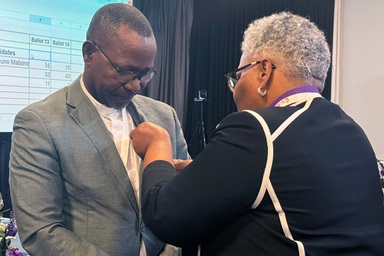United Methodist women in Liberia are aiming to keep rural girls in school during their menstrual cycles with the launch of a new program to make reusable sanitary pads locally.
“These young girls are disadvantaged by their male counterparts when they have to leave school because of this natural phenomenon,” said United Methodist pastor Rose Farhat, director of women’s ministries.
She pointed out that the girls often miss their tests, and getting teachers to administer makeups is a struggle that sometimes leads to teachers taking advantage of the young girls — making them pay money or manipulating them into unwanted sexual activities.
The new program, launched Jan. 22, is funded by a $5,000 grant from United Methodist Women. The menstrual pads — made from local materials, including cotton — will be assembled by the district women and distributed to girls who can’t afford imported sanitary products.
Farhat told United Methodist News that the menstrual pads are hygienic, comfortable and reusable, which will save the girls money for school activities. She said that the project will be implemented throughout the 20 districts of the conference.
“This project is timely because the education standards of our rural girls are dropping very fast because of the menace that their menstrual cycle is causing them,” she said.
Farhat said the yearlong project will teach more than 60 women how to make the cloth menstrual pads.
“Our goal is to reach every town and village where The United Methodist Church has its presence,” she said.
Elizabeth G. Vonyon, a beneficiary, said the cloth menstrual pads don’t have the same restrictions as imported pads and are much easier to use.
“You can use the cloth menstrual pad until you are ready to change it, but the imported pad has rules, such as you cannot keep it on for more than three hours.”
She urged churchwomen in Liberia to continue making and distributing the pads for as long as they can, stressing that not every girl can afford to buy the imported menstrual pads.
The president of United Methodist Women in Liberia, Muriel V. Nelson, said the project is intended to address the challenges that young girls in rural communities face during menstruation.
“It is the shame and their inability to buy the imported pad that keep them out of school and other social gatherings.”
She pointed out that while the pads are not for sale, an affordable fee — to be determined by United Methodist Women — will be charged to help the women keep the project alive.
“Sometimes, when you don’t pay for things, you don’t value them,” she said.
Subscribe to our
e-newsletter
The launching of the cloth menstrual pad project was part of the official annual conference session of United Methodist Women in Liberia, which was held Jan. 20-26 at the Camphor Mission in Grand Bassa County, southern Liberia.
The gathering included a Thursday in Black Parade, the official fundraising campaign for the construction of a new Women Village (featuring conference and training centers, administrative offices and a hostel), and skills training activities such as the making of the cloth pads, soap and traditional fabrics.
Swen is a communicator in Liberia.
News media contact: Vicki Brown, Nashville, Tennessee, (615) 742-5470 or [email protected]. To read more United Methodist news, subscribe to the free Daily or Weekly Digests.
Like what you're reading? Support the ministry of UM News! Your support ensures the latest denominational news, dynamic stories and informative articles will continue to connect our global community. Make a tax-deductible donation at ResourceUMC.org/GiveUMCom.




